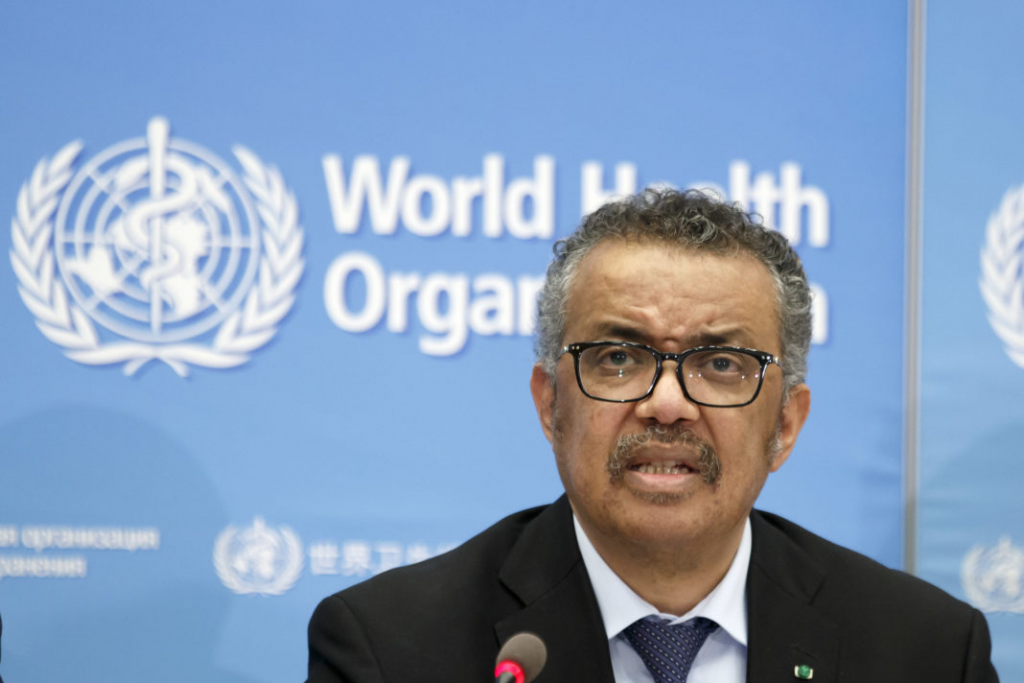Published: February 14,2022

World Health Organization (WHO) Director-General TedrosAdhanom Ghebreyesus.
Ethiopia Correspondent
Nation Media Group
The World Health Organization (WHO) on Friday began airlifting 33.5 metric tons of essential medicines, medical supplies and equipment to Ethiopia’s northern Tigray State.
According to a statement by WHO office in Addis Ababa, a first round of 10 metric tons of medical supplies was delivered on Friday at the capital MekelleAirport via two UN flights. The global health body said it will deliver a total of 33.5 metric tons of essential medical supplies with a shipment of 10 metric tons per day.
It said the drugs and medical supplies would be delivered to the war-ravaged region in the next few days. Two weeks ago, the International Committee of the Red Cross (ICRC) announced that it had managed to deliver life-saving medical supplies to Tigray by air for the first time in five months, adding that there will be more delivery flights.
Previously, WHO stated that it had not been granted permission from the Ethiopian government to deliver medical supplies to the region despite repeated requests.
Defacto blockade
Tigray is under what the UN calls ‘a de facto blockade’ which is preventing life-saving medicine and other emergency food aid from reaching millions in dire need.
Last November, WHO director-general, TedrosAdhanom, who is from the troubled Tigray region, accused the Ethiopian government of imposing “systematic blockade” against the troubled Tigrayregion, an allegation Addis Ababa dismissed.
The WHO chief said people in Tigray were starving to death and dying from lack of access to medicine. “People are dying because of lack of supplies,” Tedros, a former Ethiopian health minister said.
The Ethiopian government spokesman Legesse Tulu said that the Ethiopian government had not imposed any blockade and blamed the Tigrinyan rebel group, TPLF, for the current crisis.
“Hell in Tigray“
Last month, the WHO chief said that ‘Nowhere in the world are we witnessing hell like in Tigray’. A blockade preventing medicines and other life-saving supplies from reaching has created “hell” in the war-ravaged region, and is “an insult to our humanity”, said Tedros.
Mr Tedros accused the Ethiopian government of allowing WHO to deliver medical supplies to other war affected regions of Afar and Amhara but rejecting delivery to the Tigray region.
“It is unimaginable that a government is denying its own people food and medicine in the 21st century,” he then told reporters.
Use of Expired medications
According to ICRC, the alleged “systematic blockade” has reportedly severely limited access to diabetes medication, dialysis services, chemotherapy drugs, anaesthesia, antibiotics, and antiretroviral treatment, as well as shortages of oxygen and blood.
“In Tigray, single-use items such as gloves, surgical materials and even chest drains are being washed and reused, increasing the risk of infections. In some places, doctors have replaced disinfectants with salt to clean wounds,” Apollo Barasa, health coordinator of ICRC delegation in Ethiopia said in a recent press release.
With no options left, medical workers in Tigray are forced to apply expired and used medical equipment to save lives.
“Patients are receiving expired medications, oxygen plants are not working anymore, and some health facilities cannot provide routine vaccines,” Mr Barasaadded.
Doctors at Tigray’s largest health facility in the capital, Mekele, reportedly said that they were unable to perform surgeries due to a lack of intravenous fluids and anaesthetics.
nation.africa/kenya
 Africa -China Review Africa -China Cooperation and Transformation
Africa -China Review Africa -China Cooperation and Transformation
